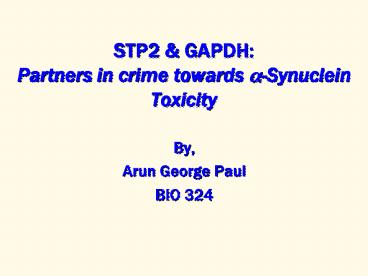STP2 - PowerPoint PPT Presentation
1 / 35
Title: STP2
1
STP2 GAPDHPartners in crime towards
?-Synuclein Toxicity
- By,
- Arun George Paul
- BIO 324
2
Acknowledgements
- Dr. Shubhik K. DebBurman
- Ruja Shrestha
- Isaac Holmes
- Chris Prater
- Tulaza Vaidya
- Sara Herrera
- Katrina Brandies
- Jessica Price
- Saccharomyces cerevisiae
3
The Big Picture Parkinson Disease (PD)
- Affects 4 million people world wide
- A Progressive Neurodegerative Disorder
- Major symptoms
- - Tremor at rest
- - Slowness of movement
- - Reduced facial expressions
- - Balance problems
4
Pathology of PD
Substantia nigra
Perves, Augustine, Fitzpatrick et
al.Neuroscience, 2nd edition Spillantini,
Schmidt, Lee et al ?-Synuclein in lewy bodies.
Nature 1997.
5
Molecular Theme of PD
6
What is ?-Synuclein ?
What we know?
- Membrane Binding Protein
- Proposed to be a dopamine transport protein
What we do not know?
- Why misfolded in dopaminergic neurons
- Proteins Linked to Misfolding
7
The Willingham Study
Willingham, Stephen, Tiago Fleming Outerio,
Michael J. Devit, Susan L. Lindquist, and Paul
Muchowski. 2003. Yeast Genes that Enhance the
Toxicity of a Mutant Huntingtin Fragment or
?-synuclein. Science, 302, 1769.
8
Why STP2?
9
What is STP2?
STP2 is required for amino acid intake
Nucleus
STP2
de Boer M, Nielsen PS, Bebelman JP, Heerikhuizen
H, Andersen HA, and Planta RJ. Stp1P, Stp2P, and
Abfip are involved in regulation of expression of
the amino acid transporter gene BAP3 of
Saccharomyces cerevisiae. Nucleic Acids Res., 28,
974.
10
How is STP2 ?-Synuclein Toxicity Linked ?
STP2 deletion increases GAPDH Levels
Nucleus
STP2
Eckert-Boulet N, Nielsen PS, Friis C, dos Santos
MM, Nielsen J, Kielland-Brandt MC, and Regenberg
B. 2004. Transcriptional profiling of
extracellular amino acid sensing in Saccharomyces
cerevisiae and the role of stp2 and stp2. Yeast,
21, 635.
11
How is GAPDH important?
- GAPDH is a glycolytic protein
- GAPDH deletion rescues PD neurons
- GAPDH is localized with ?-Synuclein in Lewy
Bodies - GAPDH3/Hsp35 is a heat shock protein
12
How is STP2 ?-Synuclein Toxicity Linked ?
My Hypothesis
13
How do I test my hypothesis?
Aim 1
?
Mildly Toxic
Enhanced by STP2 Deletion
Over expression of ?-Synuclein
14
How do I test my hypothesis?
Aim 2
?
?-Synuclein Aggregates
By STP2 Deletion
Over expression of ?-Synuclein
15
How do I test my hypothesis?
Aim 3
?
16
How do I test my hypothesis?
Aim 4
?
17
Our Pet
Saccharomyces cerevisiae or Bakers Yeast
18
Testing Aim 1 by Spotting Assay
STP2
Prediction 1
Over expression of ?-Synuclein
pYES2
-
?
WT
Enhanced by STP2 Deletion
-
A30P
-
Mildly Toxic
A53T
-
A30P/ A53T
-
19
Testing Aim 2 By Immunoblotting
Prediction 2
STP2 Deletion
?-Synuclein
20
Testing Aim 2 By GFP Microscopy
Prediction 2
STP2 Deletion
?-Synuclein
21
Testing Aim 2 By GFP Microscopy
Prediction 2
STP2 Deletion
?-Synuclein
STP2 Deletion and Non-Deletion Showed the
Following Phenotypes
A30P/ A53T
A53T
pYES2
WT
A30P
Peripheral
Peripheral
Cytoplasmic
Cytoplasmic
22
Testing Aim 2 By GFP Microscopy
Prediction 2
STP2 Deletion
?-Synuclein
STP2 Deletion and Non-Deletion Showed the
Following Phenotypes
A53T
A53T
WT
WT
23
Testing Aim 3 By Immunoblotting
Prediction 3
24
Testing Aim 4 by Spotting Assay
STP2
Prediction 4
pYES2
-
GAPDH
WT
-
?
A30P
-
Reduced Cell Death
A53T
-
A30P/ A53T
-
25
My Hypothesis
26
What did we see?
STP2
27
Negative Results are as important as positive
results in the pursuit of science
28
The Act of Troubleshooting What did we do
different?
29
The Act of Troubleshooting What did we do
different?
30
The Act of Troubleshooting What did we do
different?
31
The Act of Troubleshooting What did we do
different?
STP2
32
The Act of Troubleshooting What did we do
different?
STP2
- They used a DNA Microarray
- GAPDH signal might have been a false positive
33
Our Proposal
34
Future Research
- Applying New Techniques for Detecting Toxicity
FUN Racker Assay - Testing our hypothesis on Non-4741/pYES2
?-Synuclein Systems - Investigating the potential aggregates we saw
- Exploring the link of GAPDH and ?-Synuclein in
yeast
35
(No Transcript)

